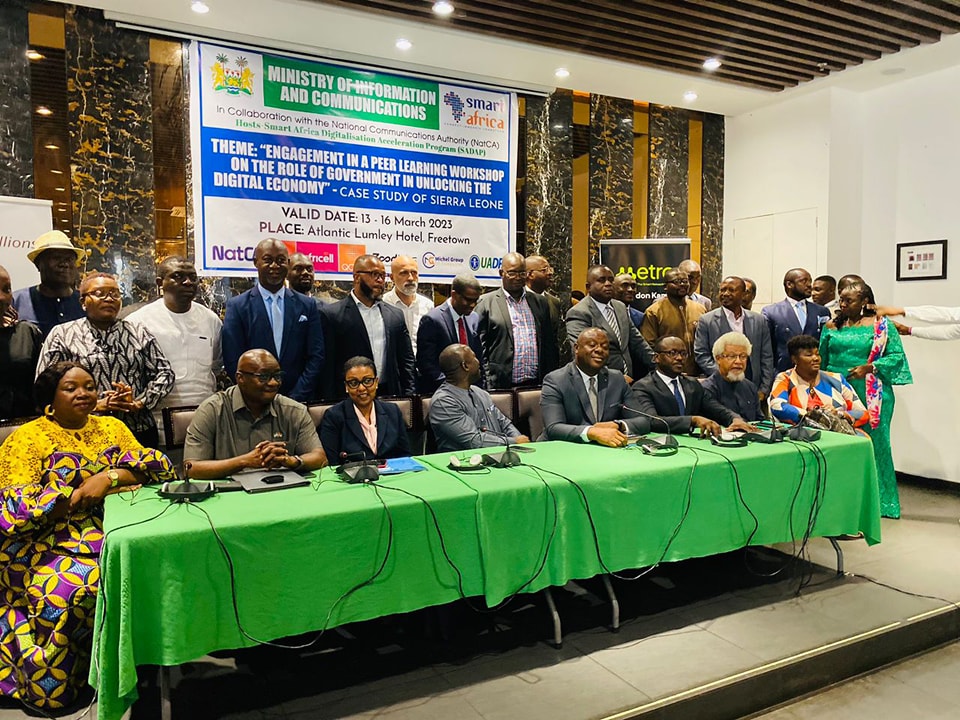232news
By Ibrahim Joenal Sesay
The Ministry of Information and Communications in collaboration with the National Communication Authority (NatCA) in a bid to accelerate sustainable socio-economic development on the continent, ushering Africa into a knowledge economy through affordable access to Broadband and usage of Information and Communications Technologies, with support from the Smart Africa Program concluded a 3-day peer learning and stakeholders’ Workshop on Smart Africa Digitalization Acceleration Program (SADAP).
The workshop which ended on Thursday 16th March, 2023 has it theme: “Engagement in a Peer Learning on the Role of Government in Unlocking the Digital Economy- A case study of Sierra Leone.”
The 3-day workshop, which focused on how the world is going digital and how Governments across the world are using digital tools to provide social and economic services to their citizens was held at the Atlantic Lumley Hotel on Lumley Beach Road in Freetown.
Speaking during the opening of the workshop, the Operations Officer at World Bank, Lydia Mesfin said that the Government of Sierra Leone saw digital technologies and the digital economy as an engine for national development and made lots of efforts in driving that agenda in the last few years, adding that when the COVID-19 pandemic hit, countries that leveraged on digital assets – broadband connectivity and digital public infrastructure reached more beneficiaries and delivered social assistance faster and more transparently.
She said that the workshop is organized at a very important time, and they are glad to see more collaboration and partnership in the growing digital ecosystem in Sierra Leone, adding that the World Bank support the Sierra Leone Digital Transformation Project, with a total of $50 million USD project to support expanding access to broadband internet, enhance digital skills and to improve Government’s capacity to deliver public services digitally.
Lydia Mesfin concluded by stating that digital transformation requires joint efforts of all stakeholders. She said that the World Bank wishes to further strengthen collaboration among development partners and broader stakeholders who are active in digital space in Sierra Leone maintaining how Digital economy is transformational for much of Sub-Saharan Africa and Sierra Leone cannot afford to be left behind.
The Chief/ Strategy & Growth Officer, Smart Africa, Didia Nkurikiyinfura, said the workshop is organized under the auspices of the Smart Africa Secretariat in close collaboration with the Government of Sierra Leone as part of Smart Africa Digital Acceleration Program (SADAP) with the main objective of “Leveraging the Digital to accelerate Africa’s socio-economic transformation”.
He revealed that Smart Africa’s mission is to transform Africa into a single digital market by 2030 saying this transformation cannot become a reality without a real commitment from stakeholders, to help develop national policy to promote connectivity and enhance an adequate and harmonized regulatory framework.
Didia Nkurikiyinfura maintained that during the four days of the workshop, through the different interventions, presentations and exchanges, they will review the requirements mentioned above to successfully carry out the mission of digital transformation of their dear continent through the example of Sierra Leone.
“According to the GSMA’s State of Connectivity in Africa 2022 report, 22% of the population is connected (approximately 240 million people), 61% of the population suffers from a digital service usage gap (680 million people) and 17% of the population (180 million people) suffers from a coverage gap,” he disclosed.
The Director General of NatCA, Daniel Kaitibi, in his statement said as a regulator they work with the Government, operators and consumers. He said the decision they make are deliberate and intentional and may affect the people they work with positively or negatively as a regulator.
He added that those decisions are to make sure that everybody have access and welcomed the decision of Smart Africa.
Giving the keynote address, the Deputy Minister of Information and Communication, Solomon Jamiru, described the 3-day peer learning and stakeholder’s Workshop as very historic and that it will give a sense as to how they are all on the technological curve.
He said that there is still a need to connect Africa with Africans and that it is also important to connect African businesses and, in the process, will cluster into Africa trade.
The Deputy Minister said that in 2021 when the ITU Telecoms Africa was hosted in South Africa, Africa was the most unserved, adding that 22 years later Africa is still unserved of which he maintained that more work is needed to be done.
He said that the peer learning and stakeholder’s Workshop is a wonderful opportunity for countries to look inwards and to be inspired by the countries specific examples in order to look at the diversity of their interventions and also be able to take with strong determination appropriate steps to ensure that they reach the unserved and underserved areas.
Other representatives present at the workshop, including Mobile Network Operators also made similar statements during the opening of the workshop.
Zoodlabs, Michel Group of Companies and Universal Access Development Fund (UADF) also participated in the workshop as key players in the drive of digital transformation in Sierra Leone.

